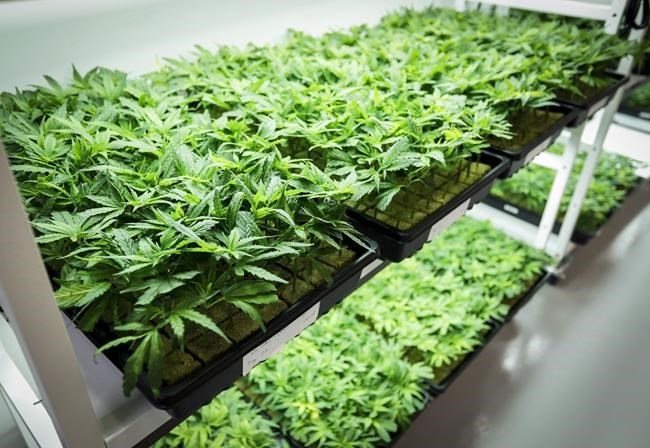OTTAWA — An internal audit by Veterans Affairs Canada suggests Ottawa has all but lost control as it shells out hundreds of millions of dollars for veterans' medical marijuana each year without proper oversight, direction or evidence of health benefits.
Quietly published this week, the audit’s results come amid an explosion in the number of veterans seeking reimbursement for their medical pot, from around 100 in 2014 to more than 18,000 last year — with no end to the surge in sight.
The result: Veterans Affairs spent more than $150 million on medical marijuana last year — more than on all other prescription drugs combined. And that number is expected to grow to $200 million this year and $300 million by 2025-26.
Yet even as demand has grown exponentially, auditors found a continuing paucity of research about the medical benefits — and risks — of veterans using cannabis, especially those struggling with psychological trauma.
This has coincided with a lack of direction and control over who can get medical marijuana, what conditions the drug is being prescribed for, and how veterans are getting authorization for their CMP — cannabis for medical purposes.
"VAC has taken steps to operationalize its policy to provide veterans with access to reimbursement for their CMP treatment," the audit reads. "However, there remain serious gaps in internal controls in the areas of veteran health and program management."
Veterans Affairs started reimbursing a small number of former military personnel for their medical cannabis in 2008, at which point the approvals were granted on an extremely limited basis and with the approval of a medical specialist.
The move followed a series of court decisions more than 20 years ago that first allowed a legal exemption from criminal prosecution for the consumption of medical marijuana.
Then, in 2014, Health Canada relaxed its rules around who could authorize the use of medical marijuana to Canadians and for what conditions and circumstances. The new rules didn’t put a limit on the amount of pot that could be authorized, or the cost.
That change resulted in an explosion of claims and costs, despite the Liberal government’s decision in 2016 to limit claims to three grams per day at $8.50 per gram, with an allowance of up to 10 grams per day with medical authorization.
Auditors noted that what limited research information is available suggests individuals should use less than three grams of cannabis per day and have regular followups with their health-care providers.
Health Canada and the College of Family Physicians of Canada have also warned about the potential negative impact of marijuana use by individuals suffering from mental-health conditions, particularly post-traumatic stress disorder.
Yet the audit report says that Veterans Affairs has not provided any directions or restrictions on what kinds of health conditions are eligible for reimbursement of medical marijuana.
Virtually any medical condition is eligible. That includes PTSD, which auditors found was a diagnosis for "the vast majority" of veterans who have been reimbursed for medical cannabis.
At the same time, nearly 80 per cent of authorizations were for three grams of cannabis or more per day, while authorization letters from specialists for many veterans also "show very little sign of a strong physician-patient relationship."
"Followup recommendations were vague, using wording such as 'followup in six months or as clinically required,'" the report reads. "Just over half of the specialist letters we reviewed did not mention anything about followup."
That wasn’t the only thing missing, as roughly one-third of files reviewed by the auditors did not have any record of which health-care provider had actually authorized the veteran to receive medical cannabis. And many files were missing other data.
One of the audit’s more troubling findings was that 11 health-care providers were responsible for authorizing nearly 40 per cent of all requests for medical weed, including one who had signed off on nearly 1,300 such requests.
“There (is a) small number of CMP physician authorizers with very large veteran patient loads bringing into question the robustness of the medical oversight," the audit report reads.
It adds: "With limited guidance available on authorizing CMP, there is a risk that some health care practitioners may be over-prescribing the treatment."
Despite these red flags, as well as the potential risk to veterans and taxpayers, auditors found the vast majority of requests for reimbursement were approved as the department focused on ensuring access rather than monitoring and control.
That included reimbursements for 45 veterans whose medical condition was listed as a substance-abuse disorder, and 46 who were also being reimbursed for anti-depressants, anti-psychotics, benzodiazepines, opioids and narcotics.
Auditors suggested the problems are the result of the department focusing too much on setting up the reimbursement process and ensuring access, noting that the entire program is being managed by the equivalent of 3.5 staff members.
"VAC can do more to identify trends in the CMP program that may be problematic and adjust policy to safeguard the health and well-being of veterans," the report says.
"As demand for the CMP program continues to grow exponentially, VAC will need to properly manage resources and examine policy and program effectiveness."
In response to the audit, Veterans Affairs officials say they are looking at a variety of changes in terms of which conditions are eligible for reimbursement, as well as limits on the daily amount that can authorized and for what types of products.
The department is also contemplating a new, more-detailed authorization form and additional safeguards for those requesting more than three grams per day. It is not clear when the changes may be rolled out.
This report by The Canadian Press was first published Sept. 14, 2022.
Lee Berthiaume, The Canadian Press



